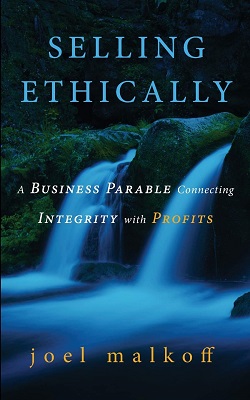Joel Malkoff formats his book Selling Ethically in a unique and interesting way. His concerns that personal ethics and business ethics should be the same is the theme of his book, and he stands by the fact that ethical behavior in business creates better customer relationships, encourages more sales, and revenue and profit will be increased. In order to be ethical, he stands by the assumption that instead of relying on the customer to be cautious it is the seller’s responsibility to be fervent. Good business practices are a must, not only for the reputation of the company, but for your own personal emotional and spiritual growth.
Malkoff’s book is written in an interesting “parable” format. Because of that, I was a bit surprised at the title and the content. Having read many how-to books on business practices, I immediately assumed this would be written in the same format with case scenarios, graphs, statistics, and the like. It is not. Whereas the core message of Selling Ethically concerns business practices, it’s spiritual content might turn away those looking for a more secular approach.
JOEL MALKOFF FACEBOOK: https://www.facebook.com/theethicsgiver/
Not that the content Malkoff presents isn’t important, nor is his method of getting his point across trivial. Selling Ethically dives into the core of a man’s soul and questions motives. Indeed, we must all look into our consciences to determine if we are being ethical, if we are deceiving others, or if we have the best interest of our customers in mind.
“The two highest levels of influence are achieved when people follow you because of what you’ve done for them, and people follow you because of who you are. In other words, the highest levels of influence are reached when generosity and trustworthiness surround your behavior.”— Dale Carnegie, author
Malkoff takes us on a journey to his own personal judgement day in a court of angels going over his past transactions. During the conversation with these heavenly beings, he is both prosecuted for things he did as salesman that hurt others and praised for what he did to prevent harm. In these chapters, we learn what was ethical, and what was not, and most importantly—why. He offers foresight into how unethical business practices can affect its victims, change their lives, and make things difficult for them in their futures. This method of teaching is effective.
AMAZON: https://www.amazon.com/Selling-Ethically-Business-Connecting-Integrity/dp/1662900023
What I find surprising is the incredible amount of deception and lack of integrity in business, sweeping from the car sales industry (which we probably all are aware of) to the medical supply industry. Surely more people checking their own ethics in the manner that Malkoff presents to them might make for a better world. Instead of pointing the finger at unethical business practices, perhaps there should be more mirrors being held up and the question asked, “How can I build my own integrity?”
Selling Ethically is an interesting journey into the personal motives of those doing business in today’s world. It’s a personal journey and I believe the book should be read as just that. It isn’t to give out to your employees, it’s too personal for that because it’s about our own journey. But if someone in your company asks how they can get on the right road to integrity, it’s a fine book to hand them.
Dianne Gardner



























